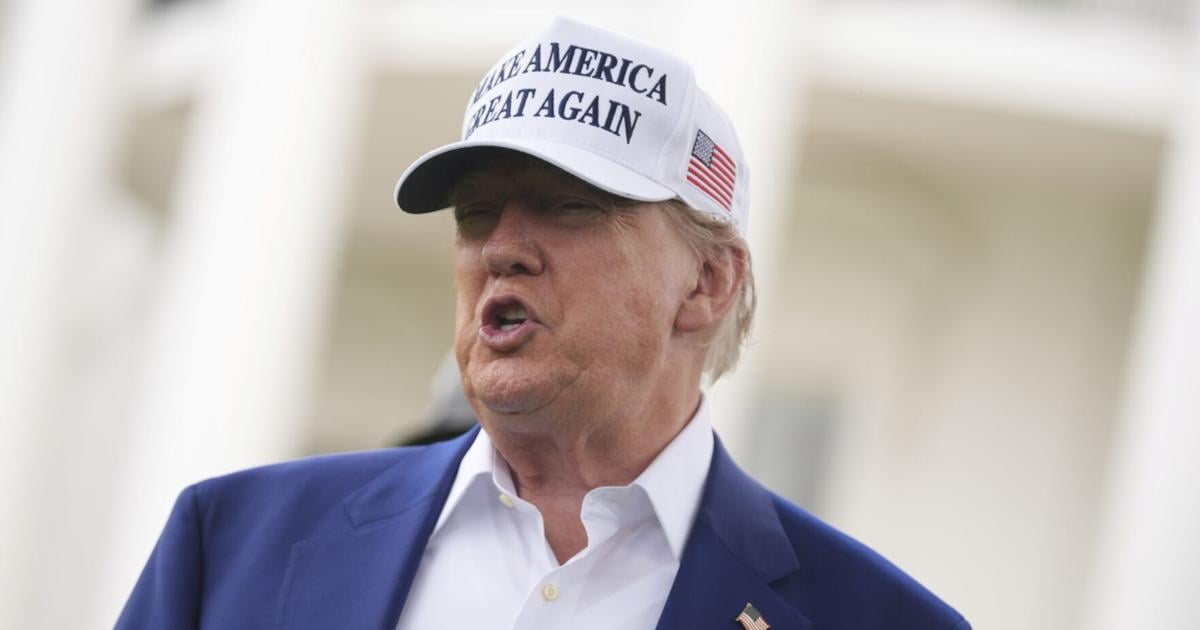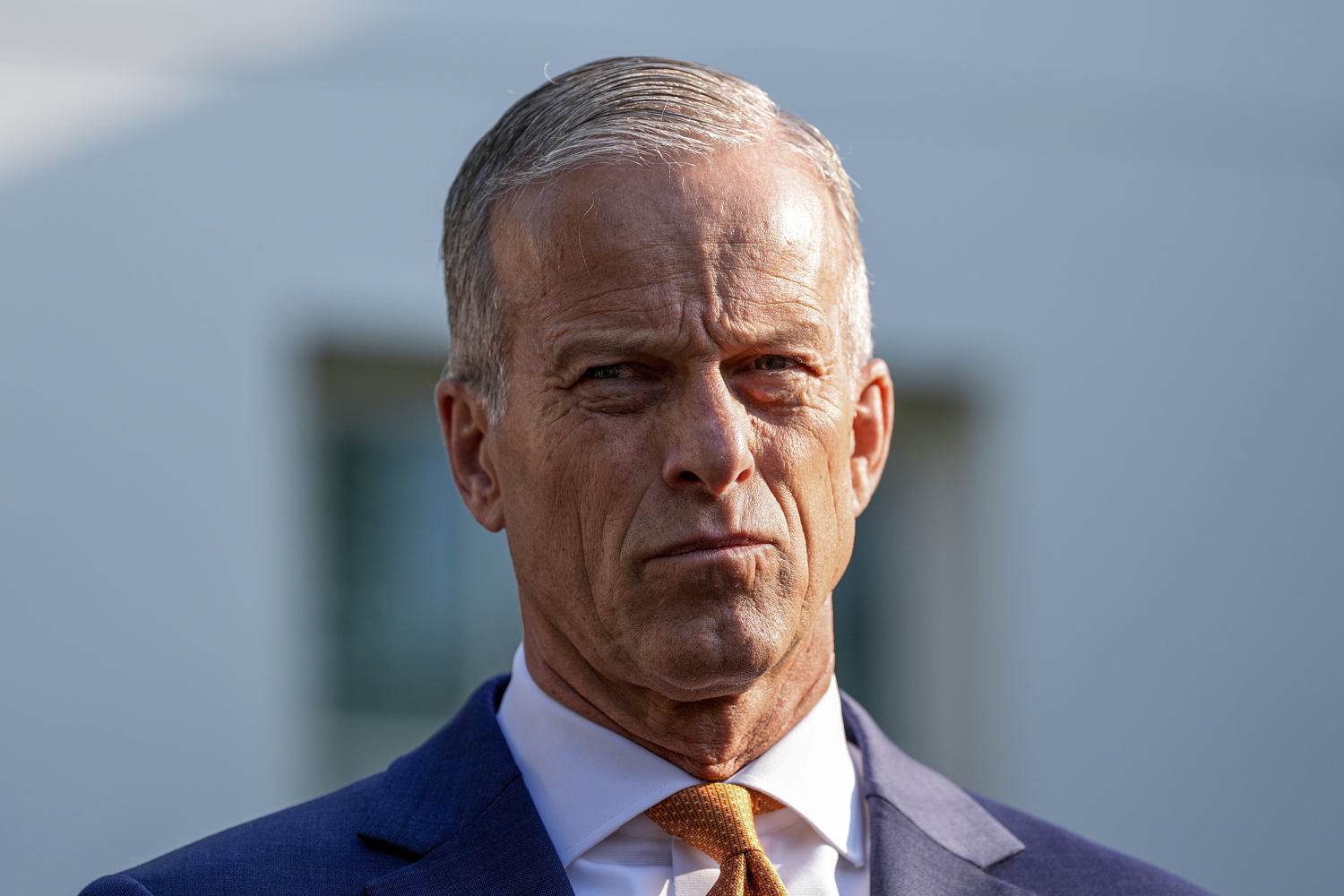The Dictatorship
‘Nobody knows’: Trump won’t say whether he will move forward with US strikes on Iran

WASHINGTON (AP) — President Donald Trump said Wednesday he doesn’t want to carry out a U.S. strike on Iran but suggested he stands ready to act if it’s necessary to extinguish Iran’s nuclear program.
Trump continued his increasingly pointed warnings about the U.S. joining Israel in striking at Tehran’s nuclear program as Iran’s leader warned anew that the United States would be greeted with stiff retaliation if it attacks.
The stakes are high for Trump — and the world — as he engages in a push-pull debate between his goals of avoiding dragging the U.S. into another war and preventing Iran from obtaining a nuclear weapon.
“I’m not looking to fight,” Trump told reporters in the Oval Office. “But if it’s a choice between fighting and having a nuclear weapon, you have to do what you have to do.”
Trump pondered his next steps as the U.S. embassy in Israel began evacuating a number of diplomats and family members who had asked to leave Israel.
Meanwhile, senior European diplomats are set to hold talks with Iran in Geneva on Friday, according to a European official familiar with the matter.
The official, who was not authorized to comment publicly and requested anonymity, said the high-ranking diplomats from Germany, France and the United Kingdom as well as the European Union’s top diplomat will take part in the talks.
Trump, who met with his national security aides for a second straight day in the White House Situation Room, also told reporters it’s not “too late” for Iran to give up its nuclear program.
“I may do it, I may not do it,” Trump said of a potential U.S. strike. “I mean, nobody knows what I’m going to do.”
“Nothing is finished until it is finished,” he added, signaling a decision could soon. “The next week is going to be very big — maybe less than a week.”
No surrender from Iran
Trump also offered a terse response to Supreme Leader Ayatollah Ali Khamenei’s refusal to heed to his call for Iran to submit to an unconditional surrender.
“I say good luck,” Trump said.
Khamenei earlier in the day warned that any U.S. strikes targeting the Islamic Republic will “result in irreparable damage for them” and that his country would not bow to Trump’s call for surrender.
Defense Secretary Pete Hegseth told lawmakers that the Pentagon was providing possible options to Trump as he decides next steps on Iran.
Trump had said Tuesday the U.S. knows where Khamenei is hiding but doesn’t want him killed — “for now.”
“He is an easy target, but is safe there – We are not going to take him out (kill!), at least not for now,” Trump said.
Trump’s increasingly muscular comments toward the Iranian government follow him urging Tehran’s 9.5 million residents to flee for their lives as he cut short his participation in an international summit earlier this week to return to Washington for urgent talks with his national security team.
Trump said that the Iranian officials continue to reach out to the White House as they’re “getting the hell beaten out of them” by Israel. But he added there’s a “big difference between now and a week ago” in Tehran’s negotiating position.
“They’ve suggested that they come to the White House — that’s, you know, courageous,” Trump said.
Iran’s mission to the United Nations rejected Trump’s claim in a statement on social media. “No Iranian official has ever asked to grovel at the gates of the White House. The only thing more despicable than his lies is his cowardly threat to ‘take out’ Iran’s Supreme Leader. ”
Enter Putin
The U.S. president said earlier this week Russian President Vladimir Putin offered to serve as a mediator with Iran. But Trump said he told Putin to keep focused on finding an endgame to his own conflict with Ukraine.
“I said, ‘Do me a favor, mediate your own,’” Trump said he told Putin. “I said, ‘Vladimir, let’s mediate Russia first. You can worry about this later.’”
The comments represented a shift for Trump, who earlier this week said he was “open” to Putin’s offer to mediate.
Russia’s Deputy Foreign Minister Sergei Ryabkov said earlier Wednesday that Moscow has cautioned Washington against offering direct military assistance to Israel.
“We are warning Washington against even speculative, hypothetical considerations of the sort,” Ryabkov said, according to the Interfax news agency. “That would be a step drastically destabilizing the situation as a whole.”
The Russia-Iran relationship has deepened since Putin launched a war on Ukraine in February 2022, with Tehran providing Moscow with drones, ballistic missiles, and other support, according to U.S. intelligence findings.
MAGA allies raise questions
Trump is also facing growing skepticism about deepening U.S. involvement in the Mideast crisis from some of his most ardent supporters. Trump during his 2024 run for the White House promised voters he would quickly end the wars in Ukraine and Gaza and keep the U.S. out of costly conflicts.
Steve Bannon, who served as a senior adviser to Trump during his first administration, said the administration should tread carefully.
“This is one of the most ancient civilizations in the world, ok?” Bannon told reporters at an event sponsored by the Christian Science Monitor. “With 92 million people. This is not something you play around with. You have to think this through. And the American people have to be on board. You can’t just dump it on them.”
Bannon and other Trump allies, including Turning Point USA’s Charlie Kirk and conservative pundit Tucker Carlsonhave raised concerns that direct U.S. involvement in the conflict could be seen as a betrayal to some members of Trump’s coalition and cause a schism in MAGA world.
To be certain, some Trump backers are supportive of the president taking military action against Iran and play down the risk of the U.S. getting mired in a conflict.
“In terms of U.S. involvement in military action, there is zero possibility of American boots on the ground in Iran,” Sen. Ted Cruz, R-Texas, said.
Trump pushed back at the notion that deepening U.S. involvement could impact his standing with his base.
“My supporters are more in love with me today, and I’m in love with them more than they were even at election time when we had a total landslide,” Trump said.
___
Associated Press writers Matt Brown, Tara Copp, David Klepper, Matthew Lee, Chris Megerian and Darlene Superville contributed reporting.
The Dictatorship
In major blow to GOP, over $500 billion of megabill’s budget cuts deemed against the rules

In the past week, Senate parliamentarian Elizabeth MacDonough has ruled that several portions of the GOP megabillthe signature legislation of President Trump’s first year back in office, violated the chamber’s rules for the budget reconciliation process, and cannot be passed on party lines. Thursday morning, MacDonough issued a slew of new rulings — and dealt a major blow to Republican plans to rush the bill to Trump’s desk.
To avoid a Senate filibuster, Republicans are moving the bill through the chamber using the budget reconciliation process, which allows bills to be passed with a simple majority. But the Senate has strict requirements for what can be passed under budget reconciliation, and on Thursday MacDonough disqualified more than a dozen of the bill’s provisions under those rulesincluding several restrictions on Medicaid, student aid and other assistance for certain non-citizen immigrants, as well as a prohibition on Medicaid and Children’s Health Insurance Program funding for gender-affirming care. Each provision, if Republicans left them in, would be subject to a 60-vote threshold — which means Democrats could block them. UPDATE (June 27, 2025, 9:25 a.m. ET): On Friday, MacDonough ruled against several more provisionsincluding increased penalties for disclosure of taxpayer information (which the GOP had pushed after leaks of Trump’s tax returns) and deregulation of gun silencers.
Senate Republicans will try to save what provisions they can by rewriting the bill’s language.
MacDonough’s most significant ruling, though, concerned the bill’s limits on the Medicaid provider tax, which helps states obtain more federal matching funds for the program. That change already faced opposition from several GOP senators, including Josh Hawley and Susan Collinswho particularly fear its impact on rural hospitals. But Republican leaders have pushed to keep it in because it would save approximately $250 billion, a desperately needed offset to the Senate bill’s additional tax cuts. In total, the parliamentarian’s decisions threaten well over $500 billion of the bill’s cutsaccording to a rough analysis from Bobby Kogan, a federal budget expert at the Center for American Progress.
Some Republican lawmakers criticized MacDonough after her rulings. On X, Sen. Tommy Tuberville, R-Ala. called for “the WOKE Senate Parliamentarian” to be fired. Rep. Greg Steube, R-Fla., demanded Vice President JD Vance “overrule the Parliamentarian” — which Vance does not have the power to do.
In fact, while it’s true that the parliamentarian is unelected, the very-much-elected senators could overrule her at any time if they wish. But as Senate Majority Leader John Thune told Punchbowl News in January“That’s totally akin to killing the filibuster. We can’t go there.” There are good arguments for getting rid of the filibuster, and Democrats even tried to change the filibuster rules in 2022 to pass a voting rights bill, only for then-Democratic Sens. Kyrsten Sinema and Joe Manchin to join Republicans against the effort. But there’s little support for that path in the Senate GOP. “That would not be a good option for getting a bill done,” Thune reiterated to Politico Thursday.
Instead, Senate Republicans will try to save what provisions they can by rewriting the bill’s language. “But it’s not really clear how many of [the provisions] they can cure,” NBC News’ Sahil Kapur told MSNBC’s Ana Cabrera. Not that Trump will be interested in those details: Republican Sen. Josh Hawley told the New York Times earlier this month that Trump wasn’t even aware of the bill’s changes to the provider tax.
What Trump will care about, though, is how it affects the bill’s timeline. “The Republican sources I’ve talked to say this is not fatal to the bill,” Kapur reported, but “the bill clearly isn’t ready for prime time as is.” The Senate had hoped to begin voting on the legislation Friday, with the goal of getting the final version to the president by July 4. The necessary rewrites — and especially the lack of clarity about the changes to the provider tax — will at least scramble that timeline, if not delay it.
Republicans in Congress want this legislation off their plates.
Republicans likely could have avoided this slapdash process had they moved the bill along more slowly. “A slow process benefits the majority,” observed Koganas it gives them more time to ensure the bill’s language doesn’t fall afoul of Senate rules or contain other errors. And surely a bill that takes away health care from millions of Americans, mostly to finance tax cuts for the wealthiest, deserves a considered, thoughtful hearing?
But Republicans in Congress want this legislation off their plates: the bill is already unpopular and only gets less popular when you ask voters about specifics. And the president, with his approval ratings deeply underwater and creeping still further down, wants a bill he can sign and show to the cameras. The details — and the consequences — are someone else’s problem.
James Downie is a writer and editor for BLN Daily. He was an editor and columnist for The Washington Post and has also written for The New Republic and Foreign Policy.
The Dictatorship
Major corporations are showing their true colors this Pride — but we’re still here

This article is part of “Finding Pride in a Divided America,” a special series from BLN Daily.
The last time I attended a Pride parade, it was 2019 in Washington, D.C. I had been to a few before — Portland, Mainewhich I had just moved away from, and of course Boston, which is something of a rite of passage for New England queers like me.
Each one felt like a corporate and political spectacle. I met Sen. Elizabeth Warren at the Boston parade in 2017, not long before she unsuccessfully ran for president. My daughter and I marched with a group of colleagues from a former employer of mine, a local Maine bank, that same year, tossing rainbow-themed tchotchkes to the cheering crowds lining Congress Street in Portland’s downtown.
It’s hard to feel proud of yourself when the parade that’s supposed to honor your identity is sponsored by Raytheon.
I didn’t go to Pride in 2020 in part thanks to Covid — but also because I was getting tired of the “corporateness” of it all. It’s hard to feel proud of yourself when the parade that’s supposed to honor your identity is sponsored by Raytheon. That dissonance is partly what led me to stop attending those events.
But looking back now, those years feel like a quaint bygone era in queer rights. With Donald Trump sweeping into office on the back of hundreds of millions of dollars spent on anti-trans ads as he led a crusade against DEI effortscorporate America responded in kind. And among the first items on the chopping block were Pride sponsorships and corporate support for LGBTQ rights.
This year, Pride has been marked by major corporations, some of which had been our community’s first corporate allies, backing out of major sponsorships. Anheuser-Busch, the parent company of Budweiser, ended its 30-year run as lead sponsor of St. Louis’ PrideFest and pulled back on its spending on San Francisco’s Pride events. Comcast, BLN’s parent company, pulled its sponsorship from San Francisco Pride.
Mastercard, PepsiCo and Citibank ended relationships with New York City Pride, while Booz Allen Hamilton, Deloitte and Visa pulled out of sponsoring WorldPride, which was held this year in Washington, D.C.
Where once companies felt free to pursue gay sales dollars, now they see political risk. All of these withdrawals follow extensive right-wing intimidation and harassment campaigns against companies that support LGBTQ people. Budweiser was at the center of perhaps the biggest controversy, when in 2023 a single Instagram partnership with trans influencer Dylan Mulvaney resulted in a massive backlash and boycott that company executives say they’re still dealing with now.
Similarly Target, while not pulling completely out of Pride festivities, significantly pared back its rainbow-themed Pride collection. The company has seen a significant drop in sales following boycotts after corporate leaders announced it was ending its corporate DEI initiatives.
Corporate money in Pride has long been a point of tension within the LGBTQ community. Some organizers argued that corporate sponsors allowed for ever-larger parades, stages and event spaces in which queer and trans people could safely celebrate Pride.
But others within the queer community took a more skeptical approach. We suspected that funding and vocal support were only as good as the cultural acceptance of the moment.
Now that we’re in the throes of an intense backlash against trans lives, and by extension the greater queer movement and LGBTQ rights, the doubters are being proved right.
It turns out that corporations are all in on Pride if it means supporting customers with extra dollars in their walletbut not so much when it comes to supporting our community’s most vulnerable, like trans people (who incidentally are statistically more likely to land among society’s poorest).
I myself have long been a critic of corporate Pride, or “rainbow-washing,” especially when many of these same sponsors also sent gobs of money to the very same conservative politicians seeking to take away the rights we have been marching for year after year. And now that these companies are retreating from their support for the community, I can’t help but get a creeping feeling at the back of my neck. It’s not just less funds to commemorate our community; we are less safe when major corporate players actively stop making space for us.
But maybe there’s something bigger to say about this moment. It was just us at the first Pride march more than 50 years ago. By standing up for our basic rights to exist, we all built a movement together that changed the country, and the culture.
The corporations may be retreating, but we still have a chance to stand together as one community, united in resisting the hatred and vitriol of those who believe none of us should exist.
Pride is still here. We are still marching on our streets for our rights. There may be fewer colorful merch items or shiny toys being tossed into the crowd. There might be fewer events and less space this June, but we’re all still here, together. Maybe it’s time for me to show my face at Pride again.
Katelyn Burns is a freelance journalist based in New England. She was the first openly transgender Capitol Hill reporter in U.S. history.
The Dictatorship
How RFK Jr.’s ‘medical freedom’ initiatives leave LGBTQ people behind

This article is part of “Finding Pride in a Divided America,” a special series from BLN Daily.
In early June, Health and Human Services Secretary Robert F. Kennedy Jr. announced his decision to purge 17 members from the Advisory Committee on Immunization Practices, a panel of public health and medical experts who advise the Centers for Disease Control and Prevention on vaccines. In the following weeks he replaced them with anti-vaccine activists and leading suppliers of misinformation. We saw the consequences many feared from this action on Thursday when new HHS hire Lyn Redwood, a nurse practitioner and president of an anti-vaccine group founded by Kennedy, presented data to ACIP on flu vaccines based on a widely debunked theory.
Kennedy’s reconfiguring of ACIP comes as part of his larger promise to, in his words, extend so-called “medical freedom” and “health choice” to all Americans.
Coming during Pride Month, the act of imposing his views under the guise of freedom and autonomy hits especially hard.
This touting of freedom, choice and independence has a particularly hypocritical ring this time of year.
This June marks the 56th commemoration of the Stonewall Riots, a week of uprisings in the early summer of 1969 when queer and trans patrons of the Greenwich Village bar revolted in response to police raids. While this year the month has been marked by the usual marches and celebrations, it’s also marked by a period when LGBTQ civil rights and cultural acceptance are facing an accelerated retraction, with an intense focus on rescinding health care access.
Kennedy and his Make America Healthy Again movement claim that his policy moves will give Americans the power to make personal health choices free from government overreach. But this MAHA agenda so far focuses on “informed choices” like whether to get routine vaccines, seeking “radical transparency” by dismantling agencies responsible for the oversight of food safety, and focusing on individual responsibility for one’s health — rather than tackling systemic issues like poverty, racism and sexism that lead to worse health outcomes.
This touting of freedom, choice and independence has a particularly hypocritical ring this time of year. Not only are they a veneer for policies that will leave Americans with fewer safety protections and diminished access to health care, but they propel support for the Trump administration’s ferocious efforts to deprive queer and trans Americans of the very same decision-making power over our own bodies and lives.
The movement has placed groups like “crunchy” teenagersmomfluencersand Gen Z and millennial women who’ve historically leaned toward the Democratic Party in a coalition with MAGA’s most far-right proponents. Using rhetoric about bodily autonomy co-opted from the reproductive justice movement, Kennedy’s movement and its (largely white) influencers have exploited real fears about fertility, food additives and pollution to generate support for another Trump election that paved the way for his administration to advance an anti-LGBTQ and anti-DEI agenda. And has it ever.
Since entering office, President Donald Trump has issued a flurry of executive orders targeting LGBTQ rights and DEI programs that impact the health and acceptance of LGBTQ people, including directing Kennedy in his capacity as HHS secretary to end access to gender-affirming care for trans youth and separately pausing funding for the PEPFAR program, which provides HIV medication and support abroad.
Under Kennedy’s leadership, HHS has placed LGBTQ people at the center of the bull’s-eye by stripping away access to health care and resources. The agency was reported in March to be weighing preliminary plans that would gut the CDC’s Division of HIV Prevention, which promotes testing, tracks HIV infections and conducts research.
In early May, HHS released a report by unnamed authors condemning gender-affirming care that the president of the American Academy of Pediatrics said “misrepresents the current medical consensus and fails to reflect the realities of pediatric care.” “The Many Report” focusing on children’s health, released in May and laden with errors, echoes the earlier document, referring to gender-affirming care for youth as an unresearched “harm.” Meanwhile, the report makes no mention of intersex children, who are often forced to undergo medically unnecessary surgeries for atypical genitalia.
Beyond the federal government, two dozen states have passed bills targeting trans people in 2025 alone, according to the Trans Legislation Trackerand lawmakers in nine states have introduced measures to weaken same-sex marriage, which has conferred the right for same-sex spouses to access each other’s health insurance and make medical decisions for their families. All this as the Supreme Court ruled to uphold a state-level ban on access to gender-affirming care for youth and has taken up a case challenging a ban on conversion therapy.
While Kennedy sets HHS’ sights on destroying access to gender-affirming care and HIV/AIDS support and research, the MAHA movement has taken up its own mantle on forms of gender-affirming care and disease prevention.
These efforts amount to an attack on the physical and mental well-being of LGBTQ Americans and seek to eradicate transgender people from existing altogether — an effort that Kennedy was complicit in long before entering government. On his own podcast and in other interviewsKennedy has falsely claimed that pollutants cause gender dysphoria, comparing trans youth to lab frogs that can be “chemically castrated” by being exposed to hormones in one discussion with the alt-right podcaster Jordan Peterson, which was removed from YouTube in 2023 for what the platform said violated its vaccine misinformation policy. In step with this disinformation, Kennedy has claimed that AIDS is caused by poppers and a “gay lifestyle,” rather than HIV.
While Kennedy sets HHS’ sights on destroying access to gender-affirming care and HIV/AIDS support and research, the MAHA movement has taken up its own mantle on forms of gender-affirming care and disease prevention. Women leaders in the movement decry a “reproductive crisis,” not by calling out diminished access to abortion care or IVF, but by focusing their criticism on hormonal birth control and mammograms. Others peddle supplements like methylene blue, which is used to treat a blood disorder but is otherwise a textile dye that followers claim provides protection from Alzheimer’s and other illnesses (there is no evidence for this, but it does turn their tongues blue).
The basis for these concerns may come from legitimate questions about birth control and a sincere desire to protect oneself against devastating illnesses. Yet there is a deeply sinister irony to MAHA’s fear that grave medical injustices are being committed against them and their families. The movement seldom, if ever, acknowledges America’s history of medical experimentation performed on Black people, forced sterilization of disabled people, and “treatments” like lobotomies and exorcisms given to “cure” LGBTQ people in the past — all part of a craven legacy that the Trump administration seeks to censor by cutting DEI programs and criminalizing the teaching of racism, slavery and inequality. But for the very groups its leaders now target, MAHA’s greatest fears have already come true.
Half a year into the Trump administration, it’s clear that Kennedy and his MAHA movement are fortifying a pipeline from wellness culture to the anti-LGBTQ far right through policy, reports and the gutting of panels vital to supporting Americans’ health, while plying supporters with debunked wellness talk and empty promises of independence.
It’s the same tired homophobia and transphobia rebranded as health freedom, and LGBTQ people — especially trans youth — are being stripped of our choices until we’ll have none at all.
-

 The Josh Fourrier Show8 months ago
The Josh Fourrier Show8 months agoDOOMSDAY: Trump won, now what?
-
Uncategorized8 months ago
Bob Good to step down as Freedom Caucus chair this week
-

 Politics8 months ago
Politics8 months agoWhat 7 political experts will be watching at Tuesday’s debate
-

 Politics8 months ago
Politics8 months agoHow Republicans could foil Harris’ Supreme Court plans if she’s elected
-
Economy8 months ago
Fed moves to protect weakening job market with bold rate cut
-
Economy8 months ago
It’s still the economy: What TV ads tell us about each campaign’s closing message
-

 Politics8 months ago
Politics8 months agoRFK Jr.’s bid to take himself off swing state ballots may scramble mail-in voting
-
Uncategorized8 months ago
Johnson plans to bring House GOP short-term spending measure to House floor Wednesday





